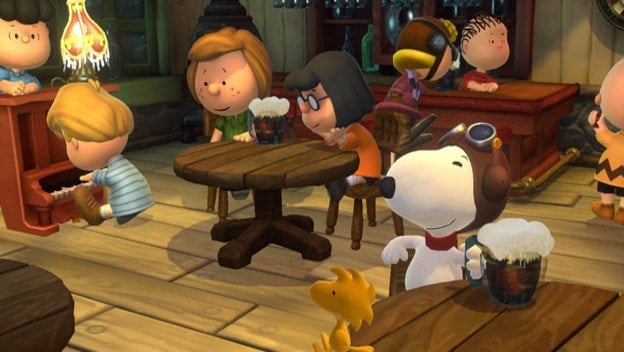The proliferation of online multiplayer has been both a boon and a bane for the gaming populace. On the one hand, it has increased the viability of multiplayer-focused projects and expanded their scope, as well as created an exponentially more social gaming environment than in generations past, all from the comfort of one’s own home. On the other hand, the combination of virtual anonymity and antagonistic natures has led to a proliferation of unseemly, or even aggressively malicious, behavior toward other players.
This isn’t just a matter of etiquette, though. The cavalier attitude significant portions of the gaming populace take toward racial, sexual, and cultural slurs has been covered in depth already. I’m a little more curious about a behavior less associated with competition and more closely tied to games in general.
I’m talking about griefing.
I only started thinking about this behavior fairly recently, during a conversation with a longtime friend. He’s primarily an old school gamer, with a passion for JRPGs, especially those from the 16-bit and 32-bit eras. As of late, though, he’s been putting a wealth of time into Minecraft, having found a stable server in which he can build to his heart’s content alongside some like-minded individuals.
A few weeks ago, he contacted me, livid. One of the other individuals on the server, with whom he’d had a wealth of interaction and thought he knew fairly well, had decided to abuse his admin privileges to do arbitrary and catastrophic damage to the peaceful little server of which he’d so long been a part. My friend was fixated. He couldn’t move past it, but he was having some degree of difficulty expressing why this so affected him.
I’d argue that, in large part, this is seen as a betrayal of trust. That understanding—the camaraderie that we generally build by seeing the same individuals day to day and having pleasant, if not deeply friendly, interactions with them—isn’t limited to face-to-face meetings, but can also come about over a networked game, through voice chat or even through text alone. The betrayal my friend felt when someone he had come to implicitly trust violated that trust was a shock to him, even though it had no palpable damage. In the end, he was dealing with ones and zeros, all of which could easily be rolled back to their prior state. Even having fixed the actual damage, his sour mood remained.
Today, we tend to associate griefing with online gaming. It’s a behavior that seems geared toward generating a wholly selfish thrill for the griefer, who purposely hampers others’ gameplay experiences. Perhaps they’re exploiting glitches or using ineffective but frustrating tactics. Maybe they’re team-killing or kill-stealing, camping the weapons you want, taking that plane that finally spawned and immediately crashing it into a nearby mountain. Looking beyond online gaming, though, I recall people abusing the Wario Stadium glitch in Mario Kart 64, and definitely remember those unscrupulous individuals who’d name a Magikarp “Mew” and offer to trade it to you for your level 100 Moltres. Stretching back still further, there were those who, in arcades, would take advantage of ungentlemanly conduct, availing themselves of glitches in an environment in which patches weren’t a universal thing.
Arcades, though, had a few interesting methods in place to keep certain kinds of griefers in check. There was the manager of the arcade, of course, who would break up most verbal or physical altercations, but there was also the coin queue, with players stacking their tokens on the arcade cabinet to save their spot in line. It kept everyone from crowding in too close around a popular machine and pushing someone who had been waiting in line for an extended period to the back.
Note that, despite the obvious functions of both the arcade manager and the coin queue, neither is ingrained in the game itself, or beholden to a formal, rigid system. They are both something that is understood, whether through tradition, in the case of the tokens, or by culturally infused authority, as is the case with the manager. The people who are in the arcade willfully cede to these symbols of authority.
The existing online systems seem to possess the form of the old arcade system, but without the same function. Both human and automated moderation occur, resulting in suspensions and bans, as well as other punishments, of the accounts of those who misbehave. They’re somewhat effective punitive measures, but they can misfire, and do little to stem the overwhelming tide of poor sportsmanship and malicious behavior that plagues online gaming.
Perhaps a codified code of conduct is necessary. Maybe players need more than a Terms of Service they can skip over to proceed onward. Maybe they need to be consciously reminded that their opponents are also people, who might not appreciate every prejudice they indulge and insecurity they attempt to hide. Nothing complex, just simple guidelines that promote civility, fair play, and thinking before speaking or acting.
Because the way things stand now, the culture that pervades online competition reinforces negative and malicious behavior, even while ostensibly trying to quell it.

It’s hard to forget the comments Aris Bakhtanians made in response to assertions of sexual harassment, that his behavior gelled with the history and makeup of the fighting game community and, in fact, was a core element of that very community. It’s not a question of whether he’s right or wrong, because that’s pretty obvious to anyone with half a brain, but the fact that he could honestly believe that something so inherently negative was crucial to the fabric of a community of people who are only linked by the games that they enjoy? That’s a huge problem.
And it comes back to griefing, because griefing is also seen as “part of the game.” If you don’t like it, play something else. The Javelin glitch in Modern Warfare 2, unscrupulous modders who would propagate infinite grenade launcher hacks across lobbies, player-killing in any MMORPG that has ever allowed it—these are all part of the game in that they exist, but it’s supposed to be kept in check by the same understanding that keeps one from violently assaulting another person in public. It isn’t just the legal repercussions one fears, the jail time and fines, but the social stigma the action carries.
Gaming today does little to enforce a social stigma on those who misbehave. Maybe, with the degree of anonymity we have, that’s simply too hard. But, then again, maybe we haven’t tried to most obvious basic solution: ask people to behave. Nicely. Cordially. But still firmly.
 | By Shelby Reiches Lead Contributor Date: February 27, 2013 |
